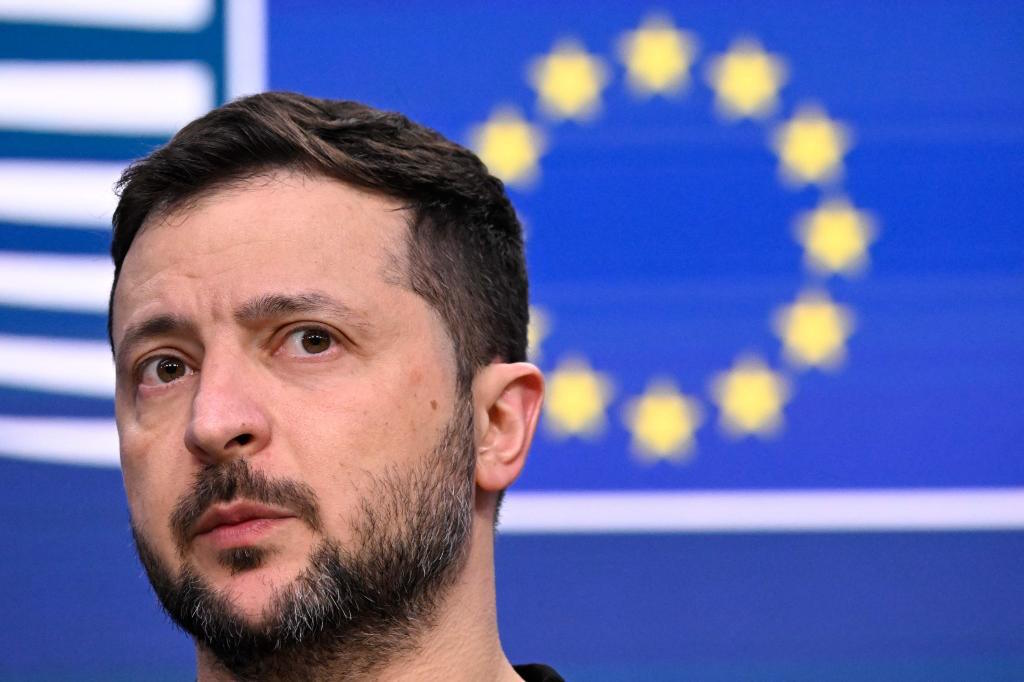Volodymyr Zelensky does not want to talk about a peace process with Russia or a ceasefire in the short term. Despite this issue becoming increasingly present in Brussels, the Ukrainian president avoids it, just like NATO Secretary-General Mark Rutte. Because, they claim, that is not the immediate step.
The first priority is to maintain unity between Europe, Ukraine, and also the United States, and then face a possible peace process from a position of strength. They do not want to show signs of weakness, and in the press conference that the Ukrainian president held this Thursday in Brussels, he did the opposite: attacking and even insulting Russian President Vladimir Putin.
"He is really dangerous, he does not care about human lives. I think he is crazy, really. And I think he himself also thinks he is crazy. He loves killing. He is very dangerous for everyone," Zelensky stated, adding that for these reasons, he is confident that the U.S. President-elect, Donald Trump, will offer his support.
"Welcome, Donald!", continued the Ukrainian leader, stating that "Trump is a strong man." "I am looking forward to having him by our side. It is very important to me, and I want to discuss more details of the war with him," he continued. He also mentioned the role of North Korea and what Russia is doing with soldiers killed in combat. "We have videos showing deceased North Korean soldiers with documentation from the Russian Federation. To prevent them from being recognized, they burn their faces," Zelensky explained, emphasizing that this situation will be resolved "when Trump returns to office."
The attempt at rapprochement has been constant, adding to Rutte's efforts with messages about increasing defense spending beyond 2% of GDP. In the European capital, it is assumed that reaching 3% will be necessary, as demanded by the U.S. President-elect, and NATO is even calling for "sacrifices" in other budget items. However, all this may not be enough to convince Trump and may force Ukraine to sit down to negotiate with Russia in the very short term, another possibility being considered in Brussels.
Zelensky's intervention in Brussels followed his meeting with European leaders at the European Council on Thursday and, more importantly, after the dinner hosted by Rutte at his official residence. The European countries belonging to the G-7 were present, including France, Italy, and the United Kingdom, as well as Denmark, Poland, and the Netherlands.
These are the nations that spend the most on defense and are most committed to supporting Ukraine. Spain was not invited to the high-level meeting, finding itself in a very difficult position as international military investment becomes increasingly important, with the government allocating only 1.28% of GDP. The government maintains that it will not reach 2% before 2029, by which time that figure will be completely outdated.
"We had a long meeting that lasted until almost 1 a.m. We are doing everything possible for Europe to have a united and strong position to bring peace. Peace is possible if we stand united against Russian madness. We are working to outline security guarantees," Zelensky posted on his X social media profile.
What are these security guarantees? In Brussels, nobody is very clear, and Zelensky himself avoided specifying them during the press conference despite being asked directly. They could range from a foreign peace mission to some kind of defense commitment in the event of a Russian attack once the peace process or ceasefire has begun.
However, the Ukrainian president wants a "real plan" and that is what he is asking from Europe and the U.S. "We have to understand that we cannot live with a frozen conflict. In every war, people know what will happen tomorrow before agreeing to a ceasefire; otherwise, you just freeze the conflict. That is why we ask for security guarantees," he emphasized. "If we have a ceasefire and everyone is happy, but Putin returns in two months, six years, one year, or two, we will lose everything, and I do not want that. I do not know what we would do then," he concluded.
